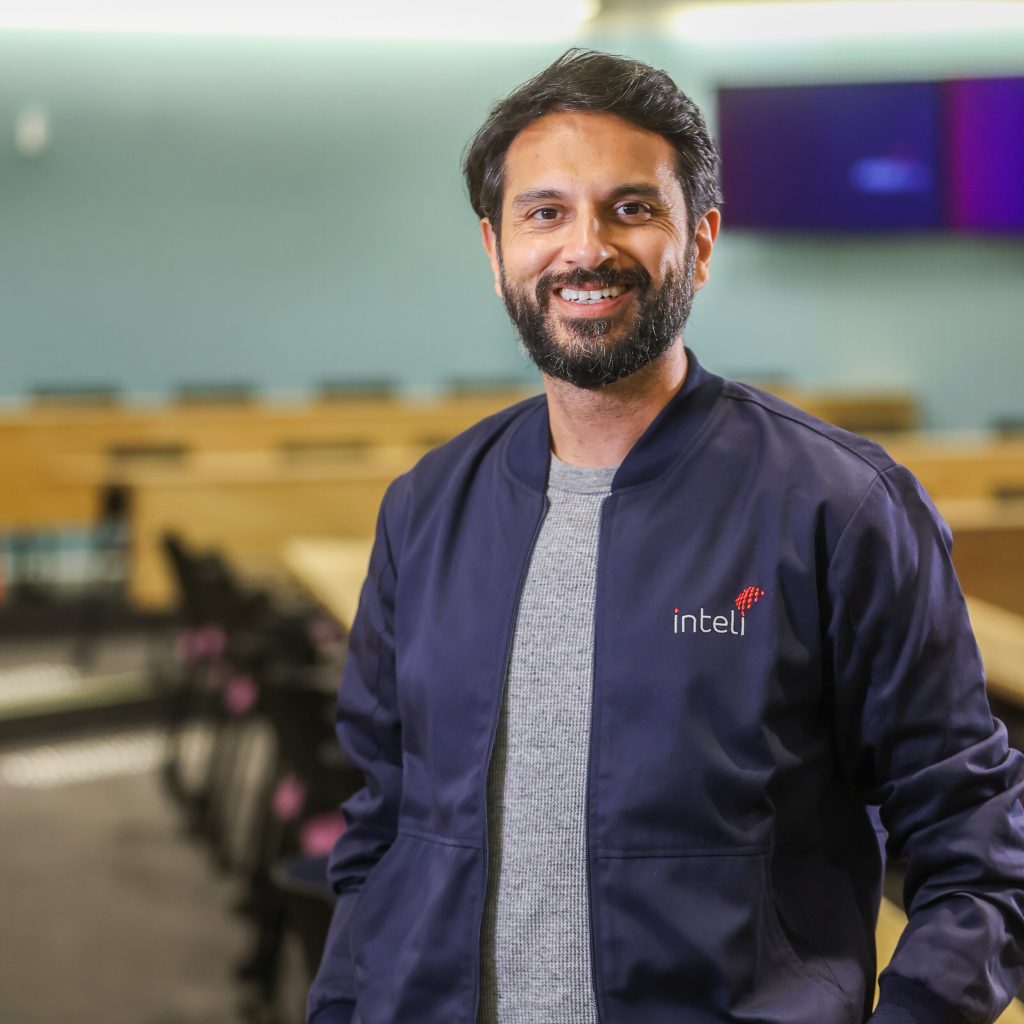Find out how Inteli helps prepare students who dream of entrepreneurship in technology.
Owning their own business is the second biggest dream of Brazilians, according to a study carried out by Sebrae and the National Association for Studies in Entrepreneurship and Small Business Management (Anegepe). And to encourage this entrepreneurial spirit, it is essential that the country invests in public policies that encourage entrepreneurship, such as entrepreneurial education.
However, a study carried out by the Brazilian Association of Higher Education Providers (ABMES) in partnership with Educa Insights, shows that young Brazilians find it difficult to develop knowledge and skills about entrepreneurship within universities.
In countries like Germany and the United States, for example, young people are encouraged to open startups and universities act as business incubators, supporting the creation of new businesses.
Find out in this article how the Entrepreneurship League, the Leadership Development Center, daily contact with the market and the entrepreneurship track help Inteli students develop an entrepreneurial mindset, preparing them to face the challenges and seize the opportunities in the world of technology business.
What does it mean to have an entrepreneurial mindset?
 "The entrepreneurial mindset can be applied to any area of life in which you seek to achieve goals, solve problems or innovate, because it involves a willingness to take responsibility for your own life and career, constantly seek personal and professional growth and embrace the opportunities that come your way," stresses Maira Habimorad, Inteli's CEO.
"The entrepreneurial mindset can be applied to any area of life in which you seek to achieve goals, solve problems or innovate, because it involves a willingness to take responsibility for your own life and career, constantly seek personal and professional growth and embrace the opportunities that come your way," stresses Maira Habimorad, Inteli's CEO.
In other words, an entrepreneurial mindset plays a crucial role in the development of a more dynamic and future-oriented society. Within universities it is possible to offer learning opportunities that encourage the development of skills such as creativity, innovation, resilience, leadership, planning and management.
At Inteli, these skills are worked on every day in projects in partnership with the market, and other activities that involve students in real entrepreneurial situations.
Center for Leadership Development (CDL)
At Inteli, 20% of the students have already signaled a concrete intention to become entrepreneurs. That's why the Center for Leadership Development (CDL) plays a vital role in training young people.
 "The CDL is divided into three pillars to support students who want to follow an entrepreneurial journey: development of socio-emotional skills; career guidance and well-being support services"explains Raj Rani, Director of People and CDL at Inteli.
"The CDL is divided into three pillars to support students who want to follow an entrepreneurial journey: development of socio-emotional skills; career guidance and well-being support services"explains Raj Rani, Director of People and CDL at Inteli.
CDL also incorporates global citizenship competencies into the curriculum, in line with the institution's values, which include ethics, sustainability, the rule of law, the market economy and various other themes, such as diversity and ESG. "These competencies prepare students to be aware and responsible citizens, capable of understanding and addressing complex global issues," says Raj.
With regard to career guidance, the strategy starts from the first year of university. Students are encouraged to embark on an introspective process and identify their talents and skills in individual and group coaching. In the second and third year, they explore market opportunities and then focus on active networking. In the fourth year, students have the chance to follow the Entrepreneurial Track, roll up their sleeves and actively work on their own business.
Find out more about CDL in this blog post.
Entrepreneurship League
 "We want to be the main university hub for startups in the country", says Rafael Cabral, a student on the Computer Science and president of the Inteli Entrepreneurship League (LEI). To get there, the League provides three products: an MVP development trail for those who don't yet have their company, a mentoring area and events with great entrepreneurs to talk to the entire Inteli community.
"We want to be the main university hub for startups in the country", says Rafael Cabral, a student on the Computer Science and president of the Inteli Entrepreneurship League (LEI). To get there, the League provides three products: an MVP development trail for those who don't yet have their company, a mentoring area and events with great entrepreneurs to talk to the entire Inteli community.
The work is already paying off. LEI was recognized as a Breakthrough League by Vortex Universitário in 2022, and has already received more than 20 awards for entrepreneurship and technology in hackathons and other national student competitions, as well as two international ones.
One of the league's projects, Steps, is an entrepreneurial trail with the aim of training members to go from zero to MVP, going through all the stages of the entrepreneurial process: identifying the problem, understanding the market, developing the solution, modeling the operation and selling and raising funds: the famous pitch.
 This whole process is accompanied by professionals and entrepreneurs from the market. And after his high performance at Steps, student Luiz Granville won the Start Fellowship competition, an incubation and acceleration program designed to offer unique opportunities and connect ecosystems.
This whole process is accompanied by professionals and entrepreneurs from the market. And after his high performance at Steps, student Luiz Granville won the Start Fellowship competition, an incubation and acceleration program designed to offer unique opportunities and connect ecosystems.
Luiz's idea that caught the eye of the Start Fellowship aims to increase the productivity of farmers. "After a lot of research and analysis, I realized that only 5% of startups in Brazil are focused on agriculture, an industry that produces billions of reais in revenue every year. I thought: oops, I have a market opportunity," says Luiz.
Aimed at students under 25, the initiative combines online and face-to-face sessions with experienced investors, classes at the University of St. Gallen in Switzerland, mentoring and coaching with experts and funding opportunities. "I have a favorable ecosystem to be able to develop the MVP, validate and then polish my idea," adds Luiz.
Daily contact with companies and real problems
Inteli's project-based methodology allows young people to apply their knowledge to real-world situations, collaborating with companies and solving real market problems. This gives students a practical and valuable understanding of business and creates opportunities to develop their careers while still at university.
 "From the first day of class, they are challenged to interact with market professionals. As well as networking, students have the chance to express their ideas, defend their projects and immerse themselves in the reality of various sectors of the economy," explains Professor Pedro.
"From the first day of class, they are challenged to interact with market professionals. As well as networking, students have the chance to express their ideas, defend their projects and immerse themselves in the reality of various sectors of the economy," explains Professor Pedro.
To help students get even more in touch with the corporate world, leading professionals are invited to share their knowledge and experience of the latest trends and practices in different sectors. They address specific topics that they experience on a daily basis, bringing real and recent cases into the classroom. "The meetings promote rich, interactive discussions with the students, who are challenged to solve a problem in real time, right in front of the company executive," adds Pedro.
 Allan dos Santos Casado, a Computer Science student, also stresses that learning about business helps to develop more autonomous, critical and entrepreneurial thinking. "This helps a lot in managing our careers, after all, a world of possibilities opens up when we leave university with business skills, leadership and a portfolio of developed prototypes," he says.
Allan dos Santos Casado, a Computer Science student, also stresses that learning about business helps to develop more autonomous, critical and entrepreneurial thinking. "This helps a lot in managing our careers, after all, a world of possibilities opens up when we leave university with business skills, leadership and a portfolio of developed prototypes," he says.
"I want to become an entrepreneur and create innovative projects that can have a significant impact on society through technological solutions," says Kathlyn Diwan, from the Information Systems course.
Want to know more about Inteli's teaching methodology? Check it out here in this post.
Want to be a tech entrepreneur? Start by getting an academic degree!
The technology sector is one of the fastest growing in the country, with a growing demand for digital solutions that make life easier for consumers and increase business efficiency. Brazil currently has 19 unicorns, which are startups valued at more than US$1 billion. These include companies such as Nubank, iFood, QuintoAndar, Gympass and Wildlife. All the companies stand out for their ability to scale quickly and offer innovative, quality products or services.
However, the business environment is complex and bureaucratic, which makes it difficult for those starting out to grow and survive. In addition, entrepreneurs face challenges such as a high tax burden, a lack of skilled labor, difficulty accessing credit, fierce competition and economic and political instability.
Overcoming these obstacles requires a lot of creativity, innovation, persistence and knowledge. This is why it is still essential to seek academic training in technology, even if there is a distorted narrative that it is unnecessary to go to university in this area. Research by McKinsey reveals that 96% of the founders of unicorns in the US have completed higher education, with the vast majority having a master's, doctorate or postgraduate degree.
In Brazil, a study carried out by Dataminer with 100 founders of the 42 main startups in the country shows that all are graduates and 57% had completed postgraduate studies before founding their company. "A solid academic background in technology greatly increases the chances of success for those who want to become entrepreneurs," points out Raj Rani, Director of People and CDL at Inteli.







